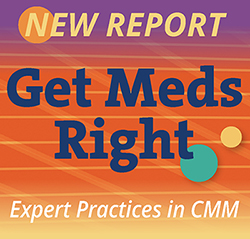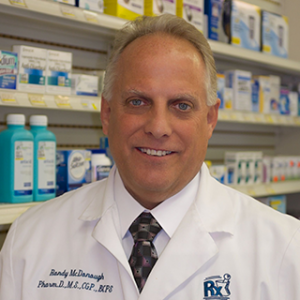 |
September 2016
|
|
|
|
Announcements - what's new & notable to the CPF Community |
 |
Get The Medications Right (GTMR)
A nationwide snapshot of pharmacy expert practices implementing comprehensive medication management (CMM) in the community

The Get the Medications Right report summarizes barriers that the participating community/ambulatory practices overcame and provides an exploration of the elements that enabled their success in delivering both advanced disease-state and CMM services collaboratively in team-based care. These practices focused on the needs of ambulatory patients in the community, following them through all transitions of care.
The first key finding identified on page 5 of the report states that the pharmacist’s role in CMM should be differentiated and redefined in terms of direct patient care delivery. This is a key learning in the continuum of the pharmacist’s role — from dispensing to CMM practice within the ambulatory pharmacy setting.
The following list describes some of the enabling factors for CMM as well as CPF grants or resources that relate to the topic.
-
Broad collaborative practice agreements that empower clinical pharmacists to identify and address all of a patient’s drug therapy problems quickly and efficiently.
-
Ability to delegate and utilize pharmacy staff effectively to maximize efficiency of pharmacists so they can focus on patient care. This may involve pharmacy techs, students, residents, clerical staff and others.
-
Consistent care processes enable rapid uptake and spread of CMM as it maximizes efficiencies, both for onboarding new pharmacists and for integration into the larger care team. Consistency spells credibility in the provider community and feeds the referral chain. It is particularly important when the CMM program seeks to integrate into ACOs and similar advanced care models that require efficient, measurable processes.
-
Follow-up processes and clinical monitoring are key to sustain desired outcomes and address condition changes in the overall care continuum.
-
Residency or mentorship training that goes beyond pharmacy school training underscores the need to develop a distinct skill set beyond the knowledge of medications. One barrier to the rapid spread of CMM is a lack of adequate residency program slots that fill this training need.
|
|
|
|
|
Board Chatter - a glimpse into what Board Members are FYI'ing and FWD'ing |
 |
NCPA Champions Bill to Boost Medicare Transparency, Ban Retroactive "DIR Fees" – The National Community Pharmacists Association (NCPA) strongly endorsed new legislation that would increase transparency and accuracy in Medicare Part D prescription drug spending and reporting and also effectively ban so-called "DIR fees" applied retroactively that threaten the viability of many independent community pharmacies.
The NCPA Annual Convention features a newly added program: Strategies to Combat DIRs. It will help independent community pharmacists know what they can do to manage the impact of DIR fees on the bottom line. More information on the meeting and registration is available at www.ncpanet.org/convention.
CA Board of Pharmacy Adopts Advanced Practice Pharmacist Certification – As of August 10, 2016, pharmacists in California may now seek certification as an Advanced Practice Pharmacist (APP). This regulation has been long awaited since the passage of the corresponding legislation in 2013. The 2013 bill created the APP designation which is required for community pharmacists to obtain in order to qualify to participate in collaborative practice agreements. The 2013 bill also expanded all pharmacists’ scope of practice by creating statewide protocols under which pharmacists can “furnish” (a.k.a. prescribe) certain products including self administered contraceptives, immunizations, travel medications, smoking cessation therapy and naloxone. More information is available from the National Alliance of State Pharmacy Associations (NASPA) update.
2016 State Fact Sheets - Health Conditions & Pharmacist Impact – Newly updated state fact sheets contain useful information for advocacy at both the state and federal level. They include a narrative of the value of pharmacists and also state-specific demographic data, demonstrating the widespread need for pharmacist-provided patient care services and the potential impact of implementing programs that provide coverage for these services. Review, share and advocate with your patients, providers and state legislators using these fact sheets today! This was a joint project with NASPA and the American Pharmacists Association (APhA) and can be accessed from the NASPA link above or the Pharmacists Provide Care website under each individual state page.
|
|
|
|
|
Grantees in the News - recognition and accolades to CPF grantees |
 |
|
Congratulations Grantees!
Next-Generation Pharmacist Awards
This national awards program honors pharmacists, technicians, students and industry advocates who are defining the future of pharmacy. Since 2010, more than 200 pharmacy leaders have been named finalists or winners. Sponsored by Parata and Pharmacy Times.
|
Entrepreneur 2016 - Winner |
Patient Care Provider 2016 - Honoree |
 Randy McDonough, BS,PharmD,MS, CGP, BCPS, FAPhA Randy McDonough, BS,PharmD,MS, CGP, BCPS, FAPhA
Towncrest Pharmacy
Iowa City, Iowa |
Ashley Abode, PharmD
Realo Discount Drugs
Wilmington, North Carolina |
|
Awarded to a pharmacist who owns a pharmacy in whole or in part and who demonstrates an entrepreneurial spirit in his or her drive and ability to grow the business or whose advocacy has helped create a better environment for future pharmacy growth. |
Awarded to a pharmacist whose focus on patient care and customer service, through a specific occasion, personal action or activity, has established himself or herself as an exemplary patient advocate. |
|
Randy McDonough is co-owner and director of clinical services at Towncrest Pharmacy, where he has developed and implemented a community pharmacy practice that focuses on patient care services. |
As a clinical service coordinator, Ashley Abode strives to enhance patient care in community pharmacy. Seeing the challenges her patients face has given her the drive to do her part to provide more comprehensive patient care beyond the pharmacy bench. Examples include disease state classes and a transitions-of-care program. |
|
CPF Grant Details Page |
CPF Grant Details Page |
 James Owen, PharmD | American Pharmacists Association James Owen, PharmD | American Pharmacists Association
Co-authored with Jann B. Skelton, RPh, MBA of Silver Pennies Consulting, a CPF-funded grant was published in the Journal of the American Pharmacists Association (JAPhA). 'Developing a vision and strategic action plan for future community-based residency training.' (J Am Pharm Assoc (2003). 2016 Sep-Oct;56(5):584-589.
The Community Pharmacy Residency Program (CPRP) Planning Committee was convened to develop a vision and a strategic action plan for the advancement of community pharmacy residency training. Aligned with the profession’s efforts to achieve provider status and expand access to care, the Future Vision and Action Plan for Community-based Residency Training will provide guidance, direction, and a strategic action plan for community-based residency training to ensure that the future needs of community-based pharmacist practitioners are met.
CPF Project Title:
Strategic Vision and Plan for the Future of Community Pharmacy Residency Training
Grant Details Page | Publication
|
|
|
|
Send us an alert if you're a grantee with news to share! |
|
|
Social Snippets - top likes, trends & discussions from Social Media |
 |
|
|
|
|
Upcoming Deadlines and Events |
 |
APhA 2017 Meeting Abstracts Deadline – October 5, 2016 at 5pm Eastern – Submission
NASPA Fall Meeting – October 14-16, 2016 | New Orleans, LA – More Information
NCPA Annual Meeting – October 15-19, 2016 | New Orleans, LA – Register
CPF Grant Applications Deadline – November 1, 2016 at Midnight Pacific – Submission
CPF Board Meeting – November 15-16, 2016 |
|
|
  |
CPF Monthly Newsletter is a publication prepared for subscribers and distribution list entries. Please send
any comments, questions, or suggestions via Contact Us. We welcome your input! |
 |
  |
|
|
|